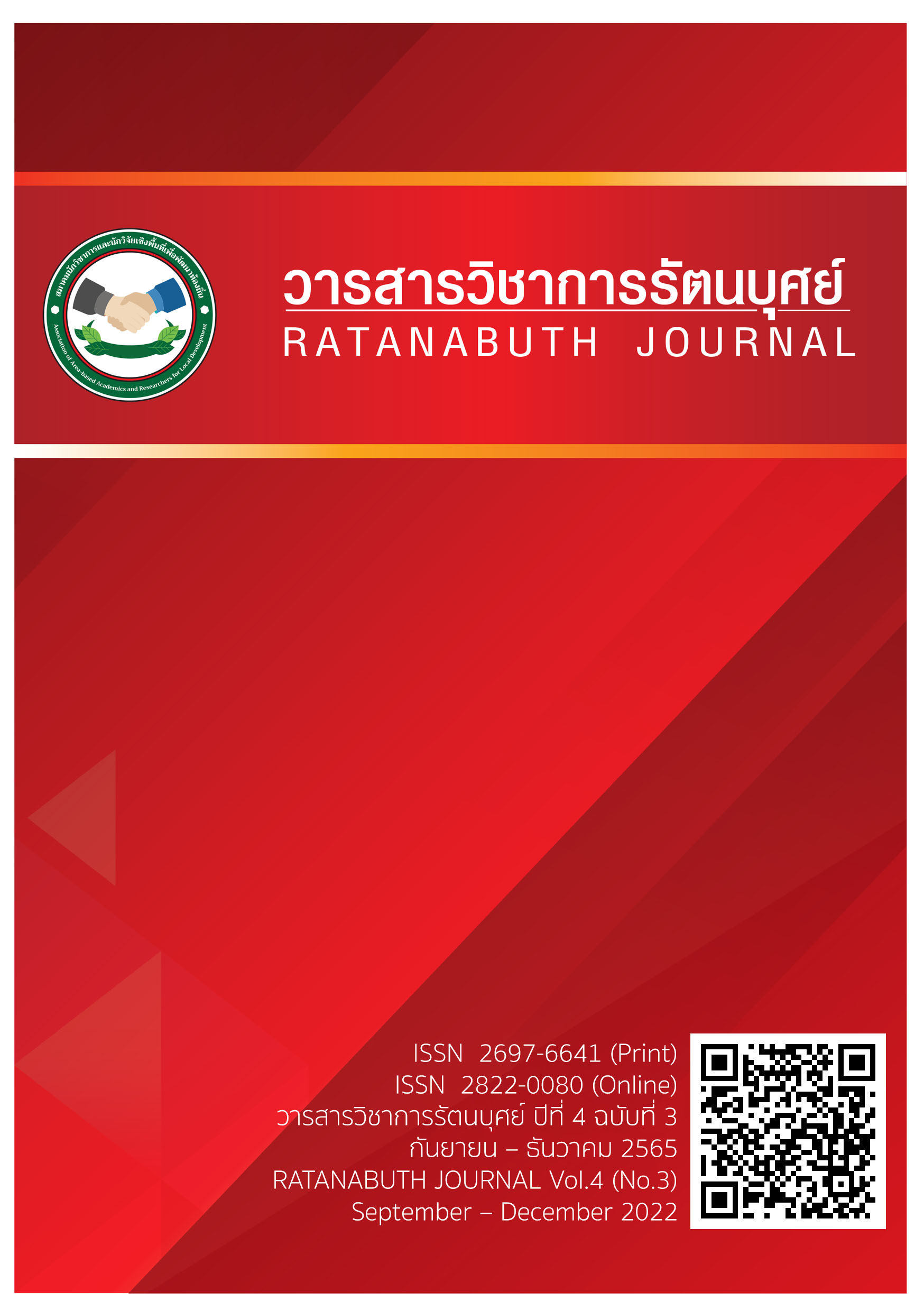The study compared stress levels among individuals with and without a history of coronavirus infection in students at Faculty of Nursing Buriram Western University
Main Article Content
Abstract
The study compared stress levels among individuals with and without a history of coronavirus infection in Nursing students Western University. This aim to study stress levels of individuals with and without a history of coronavirus infection and compared that. This research was descriptive research. The sample group used in the study were students of the Faculty of Nursing, Buriram, Western University, consisting of people with a history of infection and without history of coronavirus infection. The sample size was calculated by using the sample size calculation to test the hypothesis of differences in the mean of the two independent populations. A total of 100 samples were obtained from each group. The samples were selected using stratified sampling. The results showed that: The stress levels of individuals with a history of coronavirus infection. The stress level was 45.92%. The stress was high. And Persons without history of coronavirus infection the stress level was 43.92 percent. Stress was high. When comparing stress among individuals with and without a history of coronavirus infection in the students of the Faculty of Nursing, Buriram, Western University found no difference.
Article Details

This work is licensed under a Creative Commons Attribution-NonCommercial-NoDerivatives 4.0 International License.
References
กรมควบคุมโรค. (2565). COVID-19(EOC-DDC Thailand). โรคติดเชื้อไวรัสโคโรนา 2019. สืบค้นเมื่อ 1 ตุลาคม 2565 จาก: http://ddcportal.ddc.moph.go.th.
กมลวรรณ พลรักดี. (2565). ความเครียดและการจัดการความเครียดจากการเรียนออนไลน์ในสถานการณ์โควิด-19 ของนิสิตสาขาดนตรีศึกษา คณะศึกษาศาสตร์ มหาวิทยาลัยบูรพา. วารสารการวัดผลการศึกษา. 39(105), 298-307.
กฤชกันทร สุวรรณพันธุ์, เสาวลักษณ์ ศรีดาเกษ, ลำพึง วอนอก, สุพัฒน์ อาสนะ, วรรณศรี แววงาม, กุลธิดา สวัสดิ์ และภานุชนาถ อ่อนไกล. (2563). ปัจจัยที่มีความสัมพันธ์กับความเครียดต่อการระบาดของโรคติดเชื้อไวรัสโคโรนา 2019 (COVID-19) ของนักศึกษาคณะสาธารณสุขศาสตร์และสหเวชศาสตร์ สถาบันพระบรมราชชนก. วารสารวิจัยทางวิทยาศาสตร์สุขภาพ. 14(2), 138-148.
เกศราภรณ์ ชูพัน, พนิดา พาลี. (2565). ความเครียดและพฤติกรรมการดูแลตนเองของนักศึกษาพยาบาลในสถานการณ์การระบาดของเชื้อไวรัสโควิด-19. วารสารสมาคมพยาบาลแห่งประเทศไทยฯ สาขาภาคเหนือ. 28(1), 104-116.
ขันชัย ขันทะชา. (2565). ปัจจัยที่มีความสัมพันธ์กับความเครียดของบุคลากรทางการแพทย์ในโรงพยาบาลส่งเสริมสุขภาพตำบล จังหวัดนครพนม ในสถานการณ์การระบาดโรคติดเชื้อไวรัสโคโรนา 2019 (COVID-19). วารสารวิจัยและพัฒนาระบบสุขภาพ. 15(2), 285-299.
นุชนาฎ รักษี, กนกพร ดอนเจดีย์, นันทนัช สงศิริ, วินันดา ดีสวัสดิ์, สาลินี จันทร์เจริญ และอารี อยู่ภู่. (2564). การศึกษาความเครียด ความวิตกกังวล และสัมพันธภาพในครอบครัวของประชาชนไทยภายหลัง สถานการณ์การระบาดของโรคติดเชื้อไวรัสโคโรนา 2019 (COVID-19) ระลอกแรก. วารสารคุณภาพชีวิตกับกฎหมาย. 17(1), 94-108.
ศุภวิชย์ บุญดีสกุลโชค, ศรัณย์ วีรเมธาชัย และธนกมณ ลีศรี. (2565). ความชุกและปัจจัยที่เกี่ยวข้องกับภาวะ เครียดและภาวะซึมเศร้าในผู้ป่วยโควิด 19 ณ โรงพยาบาลสนาม เครือข่ายโรงพยาบาลสระบุรี. วารสารศูนย์อนามัยที่ 9. 16(2), 367-379.
สาดี แฮมิลตัน, จรูญศรี มีหนองหว้า และอรุณศรี ผลเพิ่ม. (2565). ความเครียดและการจัดการความเครียดของนักศึกษาพยาบาลวิทยาลัยพยาบาลบรมราชชนนี สรรพสิทธิประสงค์ ในสถานการณ์ระบาดของโรคติดเชื้อไวรัสโคโรนา 2019. วารสารสันติศึกษาปริทรรศน์. 10(5), 1926-1941.
อรอุมา รัตนบรรณกิจ. (2564). ผลกระทบทางด้านสุขภาพจิตจากวิกฤตการระบาดของโรคอุบัติ ใหม่โควิด-19.สืบค้นเมื่อ 1 ตุลาคม 2565 จาก: https://www.senate.go.th/document/Ext26534/26534832_0002. PDF.
เอกลักษณ์ แสนศิริรักษ์ และสิรินรัตน์ แสนศิริรักษ์. (2563). ความเครียดและอารมณ์เศร้าของบุคลากรทางการแพทย์ในช่วงการระบาดของโรคติดเชื้อไวรัสโคโรนา 2019. วารสารสมาคมจิตแพทย์แห่งประเทศไทย. 65(4), 400-408.


